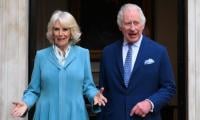LONDON: Prime Minister Boris Johnson has “absolutely” ruled out calling a general election before the UK leaves the European Union on October 31.
His comments came on Friday as he faced mounting European resistance to his call for the Brexit deal to be renegotiated. Johnson has made clear the deal thrashed out by Brussels with Theresa May is dead and he will take the UK out of the EU on Halloween, with or without a new agreement.
But Ireland claimed he has put the UK on a “collision course” with the EU, while France stressed the existing deal will not be renegotiated. Opposition from the EU to reopening the draft deal coupled with parliamentary resistance to a no-deal Brexit had fuelled speculation that Johnson will go to the country in an effort to secure an outright majority in the Commons. But Johnson, speaking during a visit to Birmingham, said: “The British people voted in 2015, in 2016, in 2017. “What they want us to do is deliver on their mandate, come out of the EU on October 31. They don’t want another electoral event, they don’t want a referendum, they don’t want a general election. They want us to deliver.” Johnson said he would “absolutely not” call for another vote.
Asked if he could reassure “Brenda from Bristol”, who famously showed exasperation at then-prime minister May’s 2017 snap general election announcement, Johnson said: “Brenda from Bristol, everyone — absolutely, absolutely.”
Johnson has spoken to Europe’s key powerbrokers since taking office but has been told the Brexit deal will not be reopened. In calls to French President Emmanuel Macron and German Chancellor Angela Merkel, he set out that the only way to make progress on a deal is to “abolish the backstop” — the contingency measure aimed at keeping the Irish border open if no other solution is found.
Critics claim it keeps the UK indefinitely tied to the EU’s trading rules. During the calls Johnson was invited to visit Paris and Berlin for further talks. But French Europe Minister Amelie de Montchalin stressed Paris’s opposition to renegotiating the deal. “We have to be very clear on that,” she told France 2. “We’ve always said that if the UK wants to leave the EU, and if it wants to do it in an orderly manner, the best thing we have is the agreement.”
She said the “divorce agreement” had not been “imposed on the British” but was the result of painstaking negotiation. “It’s two years of work between Michel Barnier’s team in Brussels and the British team to set out point by point, pragmatically, in a realistic and concrete manner, how we can mark that there is a before and an after. “It’s not us who want there to be a before and an after. What we’re trying to say is that in this agreement we are saying ‘Here is how we separate’ and for me the key, what I’d like to do in the weeks to come, is to pass that stage and negotiate calmly how we can work afterwards.”
Meanwhile, Johnson’s overhaul of the government continued, leading to warnings from departing ministers about the risks of a no-deal Brexit. Lord Bourne quit as faith minister saying “I cannot accept a no-deal”. Ardent Eurosceptic Steve Baker turned down an offer to join his government because he fears being sidelined over Brexit policy.
He insisted he has “total confidence” in the Prime Minister to deliver on his commitment to meet the October 31 deadline, but, in a sign that the European Research Group of Brexiteers will force him to keep the pledge, Baker said: “Disaster awaits otherwise.”
The Prime Minister’s official spokesman said: “That is obviously a decision for Steve Baker. He set out is full confidence in the PM delivering on his pledge that the UK will the EU on October 31.”
Opening ceremony featured cultural games, traditional music, food items, art exhibitions, fireworks, puppet shows
Under government Haj scheme, 89,000 pilgrims will travel to Saudi Arabia to perform Haj through five airlines
“If people wish to work in Europe or wish to work in North America, they should be allowed,” says Musk
Once Iran resumes transmission, normal operations are expected to return across affected areas
Guinness World Records finally invited her to event in Los Angeles in 2010 to measure her tongue
Ukraine’s military has previously said it halted strikes on Russian energy facilities on March 18







